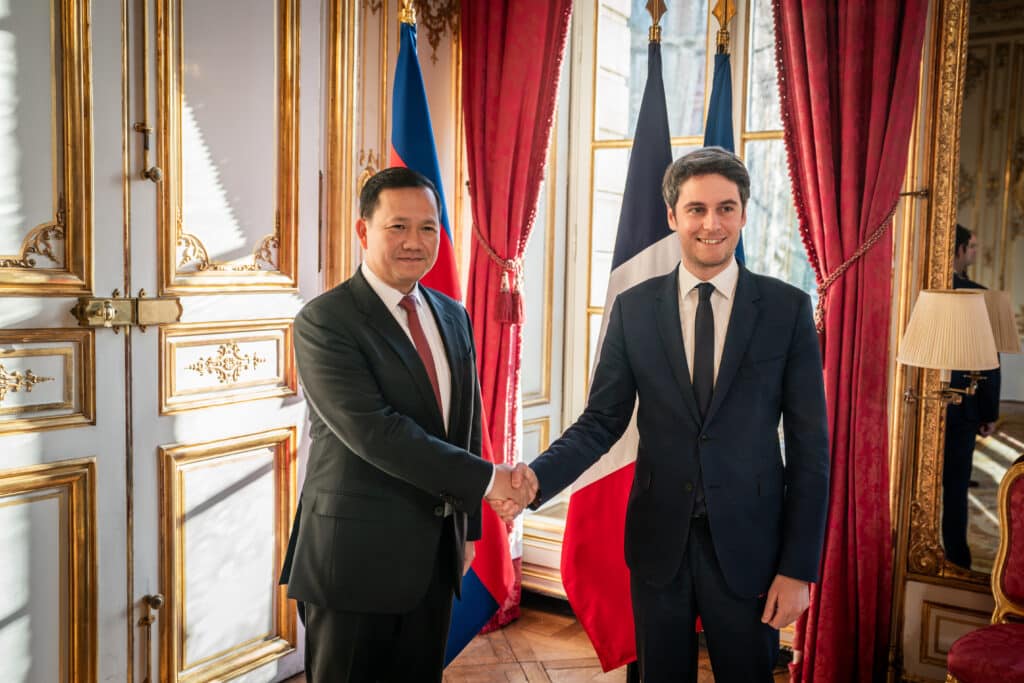By Chhay Lim
2023 marked a critical turning point in Cambodia’s contemporary political landscape as the reins of leadership passed from former prime minister Hun Sen to his eldest son, Hun Manet, in a once in three-decade premiership change. Cambodia’s leadership reshuffle has heralded a significant transformation with a younger generation of leaders pledging to steer the country towards greater growth, peace and stability.
This change in leadership also precipitated a shift in Cambodia’s foreign policy agenda. Under Hun Sen, the foreign policy was perceived as closely aligned with China, relying heavily on Chinese aid and investments for development while supporting the regime’s legitimacy. Now, Hun Manet faces the critical task of diversifying Cambodia’s foreign policy. He must maintain friendly ties with China while cultivating relationships with other nations to maximise benefits at home, as overreliance on any single country poses risks to Cambodia’s autonomy and economic stability.
Sustainable economic performance stands as the primary source of public trust, popularity and legitimacy for Hun Manet’s government. But in the face of a shifting external landscape characterised by global economic stagnation and supply chain disruptions, Cambodia must mitigate risk by adopting new strategies to diversify its economic partnerships. The prolonged slowdown in the Chinese economy and its persisting real estate crisis, a sector upon which Cambodia has long benefitted from, highlights the vulnerabilities of overdependence.
Cambodia’s construction and tourism industries have experienced rapid growth over the past decade, largely driven by Chinese investors and tourists. These sectors have emerged as strategic pillars of Cambodia’s economic expansion, respectively contributing approximately 9 per cent and 21 per cent to the country’s GDP prior to the pandemic. But the slowdown in Cambodia’s property market will likely pose more risks by increasing debt burdens, while declining Chinese consumer confidence will remain a barrier to spending on travel.
In November 2023, the World Bank projected that Cambodia’s economy will face challenges due to weak capacity in logistics and transport and an unreliable energy supply, which will continue to impose high costs for businesses and consumers. These challenges will be further exacerbated by global oil and food price shocks and weakening global demand.
Cambodia’s ruling elites are prioritising market expansion and diversifying economic relations through diplomacy. In the six months since taking office, Hun Manet’s government has embarked on a flurry of diplomatic engagements with existing and new partners at unprecedented levels. These efforts are not only challenging perceptions of Cambodia as a Chinese client state but are also necessary to diversify markets in order to facilitate investment growth and export value.
Hun Manet’s government has engaged with more than ten countries in the last six months, establishing a new level of diplomatic ties with states such as Antigua and Barbuda, Liechtenstein, Uganda, Georgia, Canada and the Netherlands. Cambodia’s approved fixed-asset investment projects have totalled US$1.39 billion during the first two months of 2024, a remarkable surge of approximately 500 percent compared to the corresponding period in 2023. The Regional Comprehensive Economic Partnership and the Cambodia–China Free Trade Agreement were significant catalysts for attracting these investments.
Equally significant to these economic gains is Hun Manet’s aspirations for external legitimacy, particularly considering widespread criticism around the undemocratic nature of his party’s political succession in 2023. There are positive signs that Cambodia’s relationship with the West has improved, with Hun Manet holding numerous bilateral meetings with his US counterparts. Looking to Europe, Hun Manet has initiated diplomatic resets with France while starting to woo smaller EU members, in hopes of strengthening a closer friendship with the European Union, an important market for Cambodian textile and footwear exports.
As Cambodia endeavours to re-establish strategic communication channels with the West, Hun Manet may have to enhance the country’s democratic conditions to gain Western favour. Cambodia should understand that opening space for civil society, independent media and improving democratic conditions will not necessarily weaken their ruling power but instead enhance Western partners’ confidence and potentially catalyse greater economic benefits through aid and investment. As Hun Manet seeks to transition from his father’s shadow, these diplomatic efforts could help build his legacy.
From Asia and Europe to Latin America and even Africa, these efforts signal a positive start towards more proactive Cambodian diplomacy on the global stage. Domestically, Hun Manet must nurture a new engine for post-COVID-19 growth, as legitimacy based on economic performance remains key to maintaining his regime’s popularity. Externally, Cambodia is keen to assume a more nuanced role in an ever-changing geopolitical landscape.
But it remains to be seen in the longer term if the current administration’s diplomatic efforts will bring more substantive economic gains. More must be done to determine the success of these endeavours, such as enhancing the capabilities of foreign service officials to engage in effective diplomacy and improving business conditions at home to attract foreign investments.
Chhay Lim is a Visiting Fellow at the Center for Southeast Asian Studies of the Institute for International Studies and Public Policy, Royal University of Phnom Penh. He is also a Young Leader for the Pacific Forum International and the Japanese government’s MEXT Scholar at Ritsumeikan University.
Nory Ly is a Chevening Scholar at the University of Bristol and a Research Associate at the Asian Vision Institute, a think-tank based in Phnom Penh.




